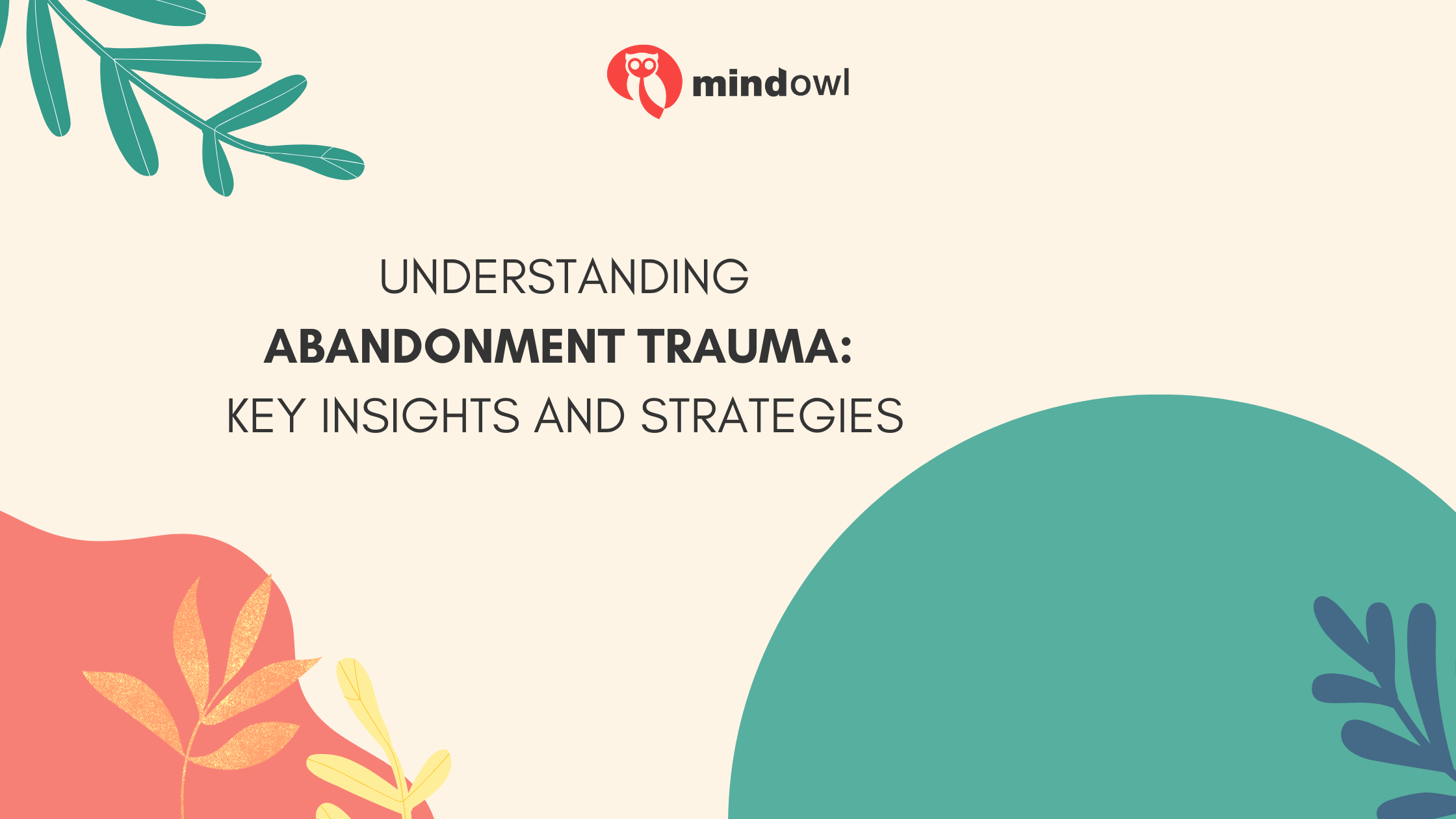Are you feeling alone, scared of being left behind by those you love? This fear might not just be a passing worry but could stem from something deeper—abandonment trauma. Abandonment doesn’t only mean physical absence; emotional neglect can hurt just as much.
Abandonment trauma affects both your mind and your heart. It can come from losing someone important, like a parent or guardian, or even through less obvious ways, such as when someone we depend on isn’t emotionally there for us.
Our blog will walk you through what this type of trauma is all about—from its signs to how one can heal from it. We’ve got strategies to cope and stories to share that prove recovery is possible.
Key Takeaways
- Abandonment trauma comes from feeling left alone and can hurt both adults and kids.
- Signs of this trauma include being very scared of ending up alone, having a hard time keeping friends or partners close, and feeling sad or worried a lot.
- People can heal from abandonment trauma by talking to therapists, building strong friendships where they feel safe and cared for, and taking good care of themselves through things like deep breathing exercises or making sure they eat well and sleep well.
- Early bad experiences, such as losing a caregiver or not getting enough love as a child, are often behind these feelings. Understanding what caused them is an important step in getting better.
- Making positive choices like asking for help from professionals or creating bonds with caring people helps manage the pain that comes with abandonment trauma.
Defining Abandonment Trauma
Abandonment trauma refers to the emotional and psychological distress caused by feeling deserted or neglected, often stemming from significant losses or unmet needs in early relationships.
It can lead to a fear of rejection, difficulty in forming and maintaining healthy connections, and may be triggered by experiences of loss or separation both in childhood and adulthood.
This type of trauma can have long-lasting effects on an individual’s mental well-being and their ability to trust others.
Emotional and psychological impacts
Trauma from feeling left behind can hurt a person deeply. It often leads to not feeling sure about forming close ties with others and seeing oneself in a harsh light. People struggle with fears of being alone and worry they will be rejected again.
This fear can make it very tough for them to trust people or feel safe in relationships. They might find themselves stuck, unable to move forward because the pain from their past keeps holding them back.
Understanding our fears is the first step towards healing.
Many face daily battles with anxiety and sadness because of these feelings of abandonment. The link between experiencing such trauma in early years and facing serious mental health challenges like major depression is strong.
Those living through this may find it hard to express happiness or maintain a stable mood over time. Coping becomes an uphill battle, leaving some to turn inward or adopt harmful behaviours as means of dealing with their deep-seated emotional scars.
Common triggers in childhood and adulthood
Understanding abandonment trauma helps us see how early experiences shape our adult lives. Both children and adults face events that can lead to feelings of being left alone or uncared for. Here’s a look at what can trigger these feelings at different stages of life.
- Childhood triggers include serious accidents, like car crashes, making kids feel suddenly alone and unsafe.
- Bullying at school or in the neighbourhood shows children that their environment isn’t safe, leading to fears of isolation.
- Exposure to terrorism or war teaches kids the world is unpredictable, heightening abandonment fear.
- Witnessing violence at home or around them makes children doubt their security and caregivers’ ability to protect them.
- Child maltreatment, whether emotional or physical, directly sends a message of unworthiness and neglect.
- Emotional neglect happens when caregivers fail to respond to a child’s needs, leaving deep scars of feeling unseen.
- Inconsistent caregiving disrupts a child’s sense of stability, leading them to question their importance and safety.
- Losing a parent or caregiver through death separates a child from their primary source of love and security.
- Significant life changes, such as parents divorcing or moving homes frequently, uproot children from familiar environments.
In adulthood:
- Abusive relationships echo earlier feelings of neglect and mistreatment, reinforcing fears of being left behind.
- Going through a divorce brings back fears from childhood traumas of separation and loss.
- The death of a significant other is a profound loss that activates previous abandonment wounds.
- Sudden job loss or financial instability can make adults feel deserted by society and question their value.
Both childhood experiences and adult incidents can instigate abandonment trauma, showing the need for understanding and healing across all ages.

Signs and Symptoms of Abandonment Trauma
Abandonment trauma triggers fears of isolation and rejection, making it difficult to maintain healthy relationships. It often manifests as anxiety, depression, and a persistent struggle with feelings of unworthiness.
Fear of isolation and rejectionFear of isolation and rejection runs deep for people dealing with abandonment trauma. This fear often starts in childhood, especially if they faced parental rejection. Such experiences can deeply impact their ability to form healthy relationships as adults.
They might dread being alone or worry constantly about someone leaving them. These fears are not baseless; research connects these emotional responses to more severe depression symptoms and a higher tendency towards harmful behaviours.
Coping with this fear requires understanding its roots–usually found in early life experiences like losing a caregiver or facing emotional neglect. Therapy, whether individual or group-based, becomes an essential tool here.
It helps individuals navigate through their emotions and develop strategies to build stable connections without the constant anxiety of abandonment hanging over them.
Parental rejection is a highly traumatic experience for a child.
Difficulty in maintaining relationships
People with abandonment trauma often find it hard to keep relationships. They might feel scared that others will leave them, just as they were left in the past. This fear can make them push away friends or partners without meaning to.
It’s a tough cycle. One day, someone with abandonment issues might cling too closely, afraid to be alone. The next day, they could act cold or distant, trying to protect themselves from getting hurt.
Trust is a big challenge for these individuals. Opening up and trusting someone not to leave can seem impossible at times. Because of their past pain—like losing a parent or being neglected—they might struggle to believe that anyone could stay by their side through thick and thin.
Therapy, like cognitive behavioural therapy or joining support groups, helps break this cycle by teaching trust-building and coping strategies.
Anxiety and depressionAnxiety and depression are common in people with abandonment trauma. They might feel a deep sadness, fear, or worry that doesn’t go away easily. These feelings can make it hard for them to connect with others, enjoy life, or even get through the day.
Adults dealing with these issues often report feeling lonely and scared of being left alone again.
To manage anxiety and depression, many find help through talking therapies like cognitive behavioural therapy (CBT). CBT helps them understand their thoughts and behaviours better, teaching ways to cope with distressing emotions.
Engaging in mindfulness practices such as meditation can also offer relief by calming the mind and reducing stress. These strategies aim to improve mental health and quality of life for those struggling with the aftermath of abandonment trauma.
Causes of Abandonment Trauma
Loss of a parent or caregiver through death or separation
Losing a parent or caregiver can shake the very foundation of a child’s world. Such loss, whether due to passing away or separation, stands as a significant cause of abandonment trauma.
Studies by experts like Wolchik and Kerns have shown that children who face these heart-breaking events may struggle with intense feelings of insecurity and fear. These youngsters often find it hard to trust others, fearing more loss will come.
Their anxiety isn’t just about missing a loved one but about feeling left behind.
A child’s grief over losing a parent reshapes their understanding of the world.
Emotional neglect or inconsistency in caregiving further complicates their healing journey. Without stable support systems, children facing such losses might develop symptoms like fear of isolation and difficulty in forming close relationships.
It underscores the importance of addressing abandonment issues early on, ensuring they receive compassionate care from family therapy or through guidance from mental health professionals specialising in childhood trauma.
Emotional neglect or inconsistent caregiving
Kids who don’t get enough love and care from their carers may face emotional abandonment. This neglect can deeply hurt them, making it tough for them to trust people later in life.
Caregivers might not mean to cause harm, but when they fail to provide steady support or ignore a child’s needs, it leads to feelings of being unwanted. This situation often sets the stage for abandonment trauma.
Sensitive caregiving acts as a shield for these kids, helping prevent long-term damage from such neglect. However, without this protection, children are left vulnerable. High stress levels from neglect affect how their brains develop.
This impact on brain growth can lead to problems with emotions and behaviour as they grow up. Studies like those by De Bellis and Zisk have shown the harm childhood trauma causes inside our minds and bodies.

Significant life changes or traumatic events
Traumatic events like the death of a parent, divorce, or abusive relationships can lead to abandonment trauma in both childhood and adulthood. According to Bremner’s study in Dialogues Clin Neurosci, traumatic stress can have lasting effects on the brain.
Childhood neglect or emotionally unavailable caregivers are common causes of abandonment trauma, which may result from significant family instability as well.
Experiencing perceived or unintentional abandonment can also lead to trauma. These life changes and events could potentially trigger feelings of isolation, rejection, and anxiety later in life.
It’s crucial for individuals dealing with abandonment trauma to seek professional help and build healthy support networks to cope effectively.
Coping Strategies for Abandonment Trauma
Engaging in therapy (individual, group, or family)
Engaging in therapy, whether individual or group, aids in healing from abandonment trauma. Cognitive Behavioural Therapy (CBT), Dialectical Behaviour Therapy (DBT), Eye Movement Desensitisation and Reprocessing (EMDR), and Internal Family Systems (IFS) are effective modalities for addressing abandonment trauma.
In addition, seeking family therapy can assist in understanding the origins of abandonment fears and promoting healthy communication within relationships.
Therapy also contributes to recognising triggers that induce anxiety and distress caused by abandonment trauma. It helps individuals establish boundaries, manage expectations, and promote internal stability.
By incorporating mindfulness techniques into individual or group therapy sessions, individuals develop coping strategies to navigate their emotional responses effectively.
Developing healthy relationships and support networks
Creating a strong support system is vital for healing from abandonment trauma. Connecting with understanding and compassionate individuals can ease the emotional burden. Establishing relationships based on trust and empathy helps in rebuilding a sense of security.
Moreover, forging healthy connections contributes to developing resilience and improving mental well-being. Alongside therapy, nurturing these relationships provides comfort and validation.
These networks offer practical assistance during tough times, reinforcing a sense of belonging and worth within community spaces such as support groups or chosen families.
Practicing self-care and mindfulness
Coping with abandonment trauma involves practicing self-care and mindfulness. Engaging in relaxation techniques, building a strong support system, fostering self-reflection, and embracing self-compassion are crucial aspects of self-care.
Furthermore, adopting positive lifestyle changes such as maintaining a healthy diet, regular exercise regimen, and consistent sleep schedule can significantly aid in the healing process.
Seeking guidance from mental health professionals is essential to effectively deal with abandonment trauma. Meditation is also recommended by psychologists as an effective method for processing trauma and promoting emotional stability.
Conclusion
Abandonment trauma is a profound emotional and psychological condition that arises from experiences of feeling deserted or neglected, often during critical developmental periods in childhood. This trauma can manifest in various ways, including intense fears of isolation, difficulties in maintaining relationships, and persistent feelings of anxiety and depression. The roots of abandonment trauma are often found in early life experiences such as losing a caregiver, emotional neglect, or inconsistent caregiving. These early experiences can significantly impact an individual’s ability to trust others and form healthy connections later in life.
Healing from abandonment trauma requires a multifaceted approach. Engaging in therapy, whether individual, group, or family-based, is crucial for processing and overcoming the deep-seated fears and emotional scars associated with abandonment. Cognitive Behavioral Therapy (CBT), Dialectical Behavior Therapy (DBT), and other therapeutic modalities can be particularly effective. Building strong, supportive relationships and networks is also essential, as these connections provide emotional stability and a sense of belonging. Additionally, practising self-care and mindfulness can help individuals manage their emotions and improve their overall mental well-being.
Understanding the causes and effects of abandonment trauma is the first step towards healing. By seeking professional help, fostering healthy relationships, and embracing self-care practices, individuals can navigate the challenges of abandonment trauma and move towards a more secure and fulfilling life.
MindOwl Founder – My own struggles in life have led me to this path of understanding the human condition. I graduated with a bachelor’s degree in philosophy before completing a master’s degree in psychology at Regent’s University London. I then completed a postgraduate diploma in philosophical counselling before being trained in ACT (Acceptance and commitment therapy).
I’ve spent the last eight years studying the encounter of meditative practices with modern psychology.

